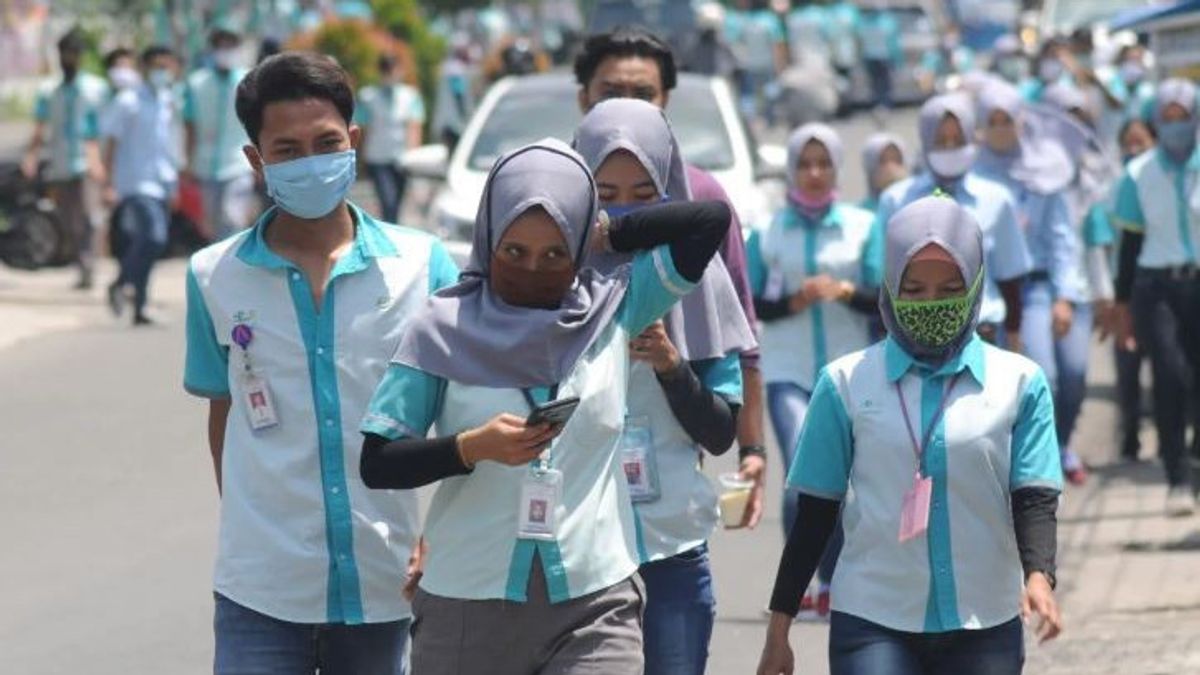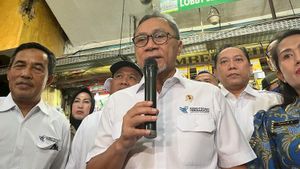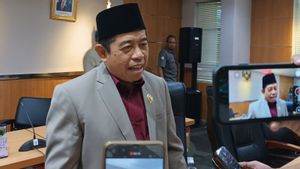JAKARTA – President Prabowo Subianto's decision to increase the Provincial Minimum Wage (UMP) to 6.5 percent in 2025 has been viewed skeptically by a number of groups. The government hopes that this policy can increase purchasing power, but according to observers this is more of a political consideration.
President Prabowo announced the increase in the UMP on Friday (11/29/2024). The former Minister of Defense said that the average increase in the national minimum wage of 6.5 percent next year was based on the results of a decision through a limited meeting with labor unions and his ministers.
Prabowo said that this increase was slightly higher than the proposal of the Minister of Manpower Yassierli, who previously recommended an increase of six percent.
Increasing workers' purchasing power while maintaining business competitiveness is President Prabowo's goal in setting the UMP increase to 6.5 percent next year.

However, this increase is considered useless by some people, considering the many things that will be imposed on workers next year, including the increase in Value Added Tax (VAT) to 12 percent.
Not Covering Workers' Expenses
The 2025 UMP increase of 6.5 percent means almost double compared to this year which was only 3.6 percent. This UMP increase is the midpoint of workers' demands for an increase of 8 percent to 19 percent, while employers are asking for a maximum increase of 3.5 percent.
It is not without reason that employers are asking for a maximum increase at that figure. The Head of the Indonesian Employers' Association's Manpower Division, Bob Azam, emphasized that a wage increase above their calculations could cause a domino effect.
If the increase in the national average minimum wage reaches 6.5 percent, business people are worried about the threat of workforce reductions, aka layoffs. This is because labor-intensive industries are very sensitive to wages.
"Wages take up a larger portion in labor-intensive industries, wages increase by 50 percent then expenses can be even higher," he said.
Jakarta's UMP in 2024 is IDR 5,067,381 and will increase to IDR 5,396,760 next year if calculated according to the provisions mentioned by Prabowo.

However, the increase in the UMP is said to be unable to cover a number of new policies that burden the working class. Recently, residents have been arguing about the increase in VAT to 12 percent next year.
Not to mention the increase in BPJS Health contributions, the discourse on changing the NIK-based KRL subsidy, and the limitation of fuel subsidies. Not to mention the issue of the people's housing savings contribution or Tapera which had caused a stir some time ago.
Director of the Center of Economic and Law Studies (CELIOS) Nailul Huda said that the increase in the UMP by 6.5 percent next year still cannot 'cover' the potential decline in purchasing power due to the increase in VAT as of January next year. The increase in VAT, said Huda, has a very high impact on demand so that even though the UMP increases by 6.5 percent, the real wage will increase very minimally.
"The loss to household consumption and GDP is very high," Huda told VOI.
The minimal increase in real wages is due to volatile food inflation which will reach five to six percent next year. In fact, for the lower middle class, the largest consumption is volatile food.
Quoting the Bank Indonesia page, volatile food inflation is inflation that is predominantly influenced by shocks in the food group such as harvests, natural disasters, or factors in the development of domestic and international food commodity prices.
Therefore, according to Huda, the 6.5 percent increase in the UMP is still lower than what workers should get. According to his calculations, the increase in the UMP should be in the range of 8-10 percent because it takes into account inflation and future economic growth.
Full of Political Considerations
In line with Huda, CELIOS Executive Director Bhima Yudhistira also doubts that the increase in the UMP can stimulate people's purchasing power which has plummeted recently.
Bhima even questioned the formulation used by President Prabowo in determining the amount of the 6.5 percent increase in the national average wage. Because PP 51/2023 is no longer valid following the recent decision of the Constitutional Court (MK) to grant the judicial review of the Job Creation Law related to employment.
But if the government refers to PP 78/2015 concerning wages, then the 2025 minimum wage increase should be 6.79 percent.
"So the decision to increase wages by 6.5% seems to be more about political considerations, not considerations based on rational formulations. In fact, it's like a negotiation. So that workers are happy and employers can tolerate it," said Bhima.
Bhima explained that the function of the minimum wage is actually not limited to providing protection for workers, but also as an economic stimulus.
Unfortunately, this concept has never been used by the government as a strategy to encourage household consumption and domestic economic turnover.
So far, according to Bhima, the government has often only used the perspective of entrepreneurs in making wage policies, assuming that low wages will create more jobs and attract new investment.
In fact, this is not the case. In the last 10 years, low wages have not necessarily boosted the absorption of labor.
Bhima also gave an example in 2014 when every IDR 1 trillion of investment that came in created the absorption of 3,313 workers. Meanwhile, in 2023, every IDR 1 trillion of investment realization that came in was only able to absorb 1,283 workers.
"This shows a distorted correlation between low wages and incoming investment," said Bhima.
Therefore, the government should change the "lagging behind" perspective. By raising the minimum wage higher, households will get higher incomes, and in the end will spend more on domestic business actors.
The English, Chinese, Japanese, Arabic, and French versions are automatically generated by the AI. So there may still be inaccuracies in translating, please always see Indonesian as our main language. (system supported by DigitalSiber.id)










